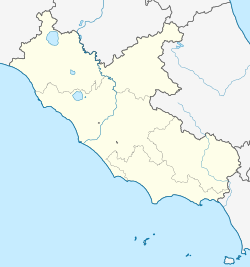Veroli | |
|---|---|
| Comune di Veroli | |
 View of Veroli | |
| Coordinates: 41°41′N13°25′E / 41.683°N 13.417°E | |
| Country | Italy |
| Region | Lazio |
| Province | Frosinone (FR) |
| Frazioni | see list |
| Government | |
| • Mayor | Germano Caperna |
| Area | |
• Total | 120 km2 (50 sq mi) |
| Elevation | 594 m (1,949 ft) |
| Population (31 December 2010) [2] | |
• Total | 20,798 |
| • Density | 170/km2 (450/sq mi) |
| Demonym | Verolani |
| Time zone | UTC+1 (CET) |
| • Summer (DST) | UTC+2 (CEST) |
| Postal code | 03029 |
| Dialing code | 0775 |
| Patron saint | Santa Maria Salome |
| Saint day | May 25 |
| Website | Official website |
Veroli (Latin : Verulae) is a town and comune in the province of Frosinone, Lazio, central Italy, in the Latin Valley.



